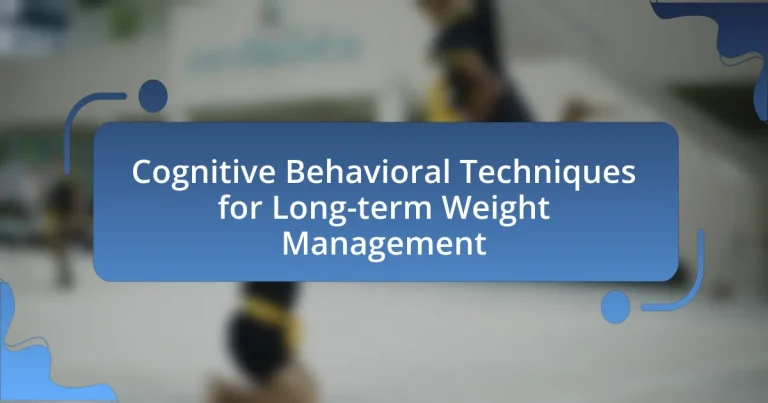Cognitive Behavioral Techniques (CBT) for long-term weight management encompass strategies such as self-monitoring, cognitive restructuring, and goal setting, which are essential for fostering healthier eating habits and sustaining weight loss. These techniques address the psychological factors influencing eating behaviors, promoting awareness and accountability through tracking food intake and physical activity. Research supports the effectiveness of CBT, indicating that individuals utilizing these methods can achieve significant weight loss and maintain it over time, with a focus on modifying negative thought patterns and reinforcing positive behaviors. Key components include structured goal setting, behavioral modification, and problem-solving strategies, all aimed at enhancing motivation and adherence to weight management plans.

What are Cognitive Behavioral Techniques for Long-term Weight Management?
Cognitive Behavioral Techniques for long-term weight management include strategies such as self-monitoring, cognitive restructuring, and goal setting. Self-monitoring involves tracking food intake and physical activity to increase awareness of behaviors, which has been shown to improve weight loss outcomes. Cognitive restructuring helps individuals identify and challenge negative thoughts related to eating and body image, promoting healthier attitudes and behaviors. Goal setting focuses on establishing specific, measurable, achievable, relevant, and time-bound (SMART) goals, which research indicates enhances motivation and adherence to weight management plans. These techniques are supported by studies demonstrating their effectiveness in promoting sustained weight loss and preventing weight regain.
How do Cognitive Behavioral Techniques influence weight management?
Cognitive Behavioral Techniques (CBT) influence weight management by helping individuals identify and change negative thought patterns and behaviors related to eating and physical activity. These techniques promote self-monitoring, goal setting, and problem-solving skills, which are essential for developing healthier habits. Research indicates that CBT can lead to significant weight loss and improved maintenance of that weight over time, as evidenced by a meta-analysis published in the journal “Obesity,” which found that participants using CBT lost an average of 5-10% of their body weight and maintained these changes more effectively than those who did not use these techniques.
What psychological principles underpin these techniques?
Cognitive Behavioral Techniques for long-term weight management are underpinned by several psychological principles, primarily cognitive restructuring, behavior modification, and self-efficacy. Cognitive restructuring involves identifying and challenging negative thought patterns related to weight and body image, which can lead to healthier behaviors. Behavior modification focuses on reinforcing positive behaviors and reducing negative ones through techniques such as reinforcement and punishment. Self-efficacy, the belief in one’s ability to succeed, is crucial as it influences motivation and persistence in weight management efforts. Research by Bandura (1977) on self-efficacy highlights its role in behavior change, demonstrating that individuals with higher self-efficacy are more likely to engage in and maintain healthy behaviors.
How do these techniques differ from traditional weight loss methods?
Cognitive Behavioral Techniques for Long-term Weight Management differ from traditional weight loss methods by focusing on changing thought patterns and behaviors rather than solely on diet and exercise. Traditional methods often emphasize calorie restriction and physical activity as the primary means of weight loss, while cognitive behavioral techniques address the psychological aspects of eating, such as emotional triggers and habits. Research indicates that incorporating cognitive behavioral strategies can lead to more sustainable weight loss outcomes; for instance, a study published in the journal “Obesity” found that participants using cognitive behavioral therapy lost significantly more weight over a year compared to those following standard dietary advice. This evidence highlights the effectiveness of addressing mental and emotional factors in achieving long-term weight management.
Why are Cognitive Behavioral Techniques effective for long-term weight management?
Cognitive Behavioral Techniques (CBT) are effective for long-term weight management because they address the psychological factors that contribute to eating behaviors and lifestyle choices. CBT helps individuals identify and modify negative thought patterns related to food, body image, and self-control, which can lead to healthier eating habits and sustained weight loss. Research indicates that individuals who engage in CBT show greater weight loss and maintenance compared to those who do not, with studies demonstrating that CBT can lead to a 5-10% reduction in body weight over a year, which is associated with significant health benefits.
What role does self-monitoring play in these techniques?
Self-monitoring plays a crucial role in cognitive behavioral techniques for long-term weight management by enabling individuals to track their eating behaviors, physical activity, and emotional triggers. This practice fosters awareness and accountability, allowing individuals to identify patterns and make informed adjustments to their habits. Research indicates that self-monitoring is associated with greater weight loss success; for instance, a study published in the American Journal of Preventive Medicine found that participants who consistently self-monitored their food intake lost more weight than those who did not. Thus, self-monitoring serves as a foundational element in effectively applying cognitive behavioral strategies for sustainable weight management.
How do cognitive restructuring and behavior modification contribute to success?
Cognitive restructuring and behavior modification significantly contribute to success in long-term weight management by altering negative thought patterns and reinforcing positive behaviors. Cognitive restructuring helps individuals identify and challenge distorted beliefs about food, body image, and self-worth, leading to healthier decision-making. For instance, research indicates that individuals who engage in cognitive restructuring are more likely to develop a positive self-image and maintain motivation for weight loss (Hollon et al., 2002).
Behavior modification complements this by implementing strategies such as goal setting, self-monitoring, and reinforcement of healthy habits, which have been shown to improve adherence to dietary and exercise regimens. A study published in the Journal of Consulting and Clinical Psychology found that participants who utilized behavior modification techniques lost significantly more weight compared to those who did not (Wing & Phelan, 2005). Together, these techniques create a comprehensive approach that fosters sustainable lifestyle changes, ultimately leading to successful weight management outcomes.
What are the key components of Cognitive Behavioral Techniques for weight management?
The key components of Cognitive Behavioral Techniques for weight management include self-monitoring, cognitive restructuring, goal setting, and behavioral modification. Self-monitoring involves tracking food intake and physical activity to increase awareness of habits. Cognitive restructuring focuses on identifying and changing negative thought patterns related to eating and body image. Goal setting establishes specific, measurable, achievable, relevant, and time-bound objectives to guide behavior change. Behavioral modification employs strategies such as stimulus control, reinforcement, and problem-solving to promote healthier eating and activity patterns. These components are supported by research indicating that structured interventions incorporating these techniques lead to significant weight loss and improved maintenance of weight loss over time.
What specific strategies are included in these techniques?
Cognitive Behavioral Techniques for long-term weight management include specific strategies such as self-monitoring, cognitive restructuring, goal setting, and problem-solving. Self-monitoring involves tracking food intake and physical activity to increase awareness of behaviors. Cognitive restructuring focuses on identifying and changing negative thought patterns related to weight and body image. Goal setting entails establishing realistic and measurable objectives for weight loss and maintenance. Problem-solving strategies help individuals develop effective solutions to barriers encountered during their weight management journey. These strategies are supported by research indicating their effectiveness in promoting sustained weight loss and behavioral change.
How can goal setting enhance the effectiveness of these techniques?
Goal setting enhances the effectiveness of cognitive behavioral techniques for long-term weight management by providing clear, measurable objectives that guide behavior change. When individuals set specific goals, such as losing a certain number of pounds or exercising a specific number of times per week, they create a structured framework that facilitates accountability and motivation. Research indicates that individuals who set specific and challenging goals are more likely to achieve higher performance levels compared to those who do not set goals (Locke & Latham, 2002). This structured approach allows for the monitoring of progress, which reinforces positive behaviors and helps individuals adjust their strategies as needed, ultimately leading to sustained weight management success.
How can individuals implement Cognitive Behavioral Techniques in their weight management journey?
Individuals can implement Cognitive Behavioral Techniques (CBT) in their weight management journey by identifying and modifying negative thought patterns related to eating and body image. This involves keeping a food diary to track eating habits and emotional triggers, which helps in recognizing patterns that lead to overeating or unhealthy choices. Research indicates that self-monitoring, a key CBT strategy, significantly improves weight loss outcomes by increasing awareness of behaviors (Butryn et al., 2007, Obesity). Additionally, individuals can practice cognitive restructuring, where they challenge and replace negative thoughts with positive affirmations, thereby fostering a healthier mindset towards food and exercise. Engaging in problem-solving strategies to address barriers to healthy eating and physical activity further supports sustainable weight management.
What challenges might arise when using these techniques?
Challenges that might arise when using cognitive behavioral techniques for long-term weight management include resistance to change, difficulty in maintaining motivation, and the potential for relapse into old habits. Resistance to change often stems from deeply ingrained behaviors and beliefs about food and body image, making it hard for individuals to adopt new patterns. Maintaining motivation can be challenging due to the slow progress often associated with weight management, leading to frustration and disengagement. Additionally, the risk of relapse is significant, as individuals may revert to previous eating habits or sedentary lifestyles, especially during stressful situations or life changes. These challenges highlight the need for ongoing support and reinforcement of cognitive behavioral strategies to ensure long-term success in weight management.

What are the common misconceptions about Cognitive Behavioral Techniques for weight management?
Common misconceptions about Cognitive Behavioral Techniques (CBT) for weight management include the belief that these techniques are solely focused on diet and exercise, that they provide quick fixes, and that they are only effective for certain individuals. CBT actually emphasizes changing thought patterns and behaviors related to eating and physical activity, rather than just focusing on food intake or exercise alone. Research indicates that CBT can lead to sustainable weight loss by addressing underlying psychological factors, rather than offering immediate results. Additionally, studies show that CBT is effective across diverse populations, debunking the myth that it only works for specific groups.
Why do some people doubt the effectiveness of these techniques?
Some people doubt the effectiveness of cognitive behavioral techniques for long-term weight management due to a lack of immediate results and the perception that these methods require significant time and effort. Research indicates that individuals often seek quick fixes for weight loss, leading to frustration when cognitive behavioral strategies, which focus on gradual change and self-awareness, do not yield instant outcomes. Additionally, skepticism arises from personal experiences where individuals may have tried these techniques without success, reinforcing the belief that they are ineffective. Studies, such as those published in the journal “Obesity,” show that while cognitive behavioral techniques can lead to sustainable weight loss, the variability in individual responses can contribute to doubts about their overall effectiveness.
What evidence supports the use of Cognitive Behavioral Techniques?
Cognitive Behavioral Techniques (CBT) are supported by substantial evidence demonstrating their effectiveness in long-term weight management. Research indicates that CBT can lead to significant weight loss and maintenance by addressing the cognitive and behavioral patterns associated with eating and physical activity. A meta-analysis published in the journal “Obesity” by Cooper et al. (2010) found that individuals who participated in CBT-based interventions lost more weight compared to those who did not, with an average weight loss of 5-10% of initial body weight being maintained over time. Additionally, a study by Van Strien (2018) highlighted that CBT helps individuals develop healthier eating habits and coping strategies, which are crucial for sustaining weight loss. These findings collectively underscore the efficacy of Cognitive Behavioral Techniques in promoting lasting weight management outcomes.
How can individuals overcome skepticism about these methods?
Individuals can overcome skepticism about cognitive behavioral techniques for long-term weight management by educating themselves on the evidence supporting these methods. Research indicates that cognitive behavioral therapy (CBT) can lead to significant weight loss and improved maintenance of that weight over time, with studies showing that participants who engaged in CBT lost an average of 5-10% of their body weight and maintained it better than those who did not use these techniques. Additionally, individuals can seek testimonials and success stories from others who have effectively used these methods, reinforcing their credibility. Engaging in workshops or sessions led by trained professionals can also provide firsthand experience and understanding of how these techniques work, further reducing skepticism.
What are the potential pitfalls of relying solely on Cognitive Behavioral Techniques?
Relying solely on Cognitive Behavioral Techniques (CBT) can lead to several potential pitfalls, including neglecting underlying emotional issues and limiting the scope of treatment. CBT primarily focuses on changing negative thought patterns and behaviors, which may overlook deeper psychological factors such as trauma or unresolved emotional conflicts that contribute to weight management challenges. Research indicates that individuals with complex emotional issues may require a more integrative approach, combining CBT with other therapeutic modalities like mindfulness or psychodynamic therapy for effective long-term results. Additionally, an exclusive focus on cognitive restructuring may result in insufficient attention to physiological aspects of weight management, such as nutrition and exercise, which are crucial for sustainable outcomes.
How can individuals ensure a balanced approach to weight management?
Individuals can ensure a balanced approach to weight management by integrating cognitive behavioral techniques that promote healthy eating and physical activity. These techniques include setting realistic goals, self-monitoring food intake and physical activity, and identifying triggers for unhealthy behaviors. Research indicates that individuals who engage in self-monitoring are more likely to achieve and maintain weight loss, as evidenced by a study published in the journal Obesity, which found that participants who tracked their food intake lost more weight than those who did not. Additionally, cognitive restructuring can help individuals challenge negative thoughts about their body image and eating habits, leading to healthier choices and improved self-esteem.
What additional support might enhance the effectiveness of these techniques?
Additional support that might enhance the effectiveness of cognitive behavioral techniques for long-term weight management includes personalized coaching and social support systems. Personalized coaching provides tailored guidance and accountability, which has been shown to improve adherence to weight management strategies. A study published in the Journal of the American Medical Association found that participants receiving personalized coaching lost significantly more weight compared to those who did not receive such support. Social support systems, such as group therapy or community support groups, foster a sense of belonging and motivation, which can further reinforce positive behavioral changes. Research indicates that individuals who engage in group support are more likely to maintain weight loss over time, highlighting the importance of these additional support mechanisms.

How can one measure the success of Cognitive Behavioral Techniques in weight management?
One can measure the success of Cognitive Behavioral Techniques (CBT) in weight management through various metrics, including weight loss percentage, behavioral changes, and psychological assessments. Specifically, tracking weight loss over time provides a quantitative measure of success, with studies indicating that individuals utilizing CBT can achieve a weight loss of 5-10% of their initial body weight, which is associated with health benefits. Additionally, self-reported behavioral changes, such as improved eating habits and increased physical activity, can be assessed through validated questionnaires, demonstrating the effectiveness of CBT in modifying lifestyle. Psychological assessments, including reductions in binge eating episodes and improvements in body image, further validate the success of CBT, as evidenced by research published in the journal “Obesity,” which found that participants using CBT techniques reported significant improvements in both weight management and psychological well-being.
What metrics should be used to evaluate progress?
To evaluate progress in cognitive behavioral techniques for long-term weight management, key metrics include weight change, body mass index (BMI), dietary adherence, physical activity levels, and psychological well-being. Weight change provides a direct measure of progress, while BMI offers a standardized assessment of body fat relative to height. Dietary adherence tracks compliance with nutritional goals, and physical activity levels measure engagement in exercise routines. Psychological well-being can be assessed through self-reported mood and motivation levels, which are crucial for sustaining behavior change. These metrics collectively provide a comprehensive view of an individual’s progress in weight management.
How can individuals track behavioral changes effectively?
Individuals can track behavioral changes effectively by utilizing self-monitoring tools such as journals, mobile apps, or wearable devices. These tools allow individuals to record their daily behaviors, such as food intake, physical activity, and emotional states, which facilitates awareness and accountability. Research indicates that self-monitoring can lead to significant weight loss and behavior modification, as evidenced by a study published in the American Journal of Preventive Medicine, which found that participants who consistently tracked their behaviors lost more weight than those who did not. By regularly reviewing this data, individuals can identify patterns, set goals, and make informed adjustments to their behaviors, enhancing their ability to manage weight long-term.
What role does feedback play in assessing success?
Feedback plays a critical role in assessing success by providing individuals with information about their progress and areas for improvement. In the context of cognitive behavioral techniques for long-term weight management, feedback helps individuals understand the effectiveness of their strategies, enabling them to make necessary adjustments. Research indicates that regular feedback can enhance motivation and accountability, which are essential for sustaining behavior change. For instance, a study published in the Journal of Behavioral Medicine found that participants who received consistent feedback on their weight loss efforts were more likely to achieve their goals compared to those who did not receive feedback. This demonstrates that feedback not only informs individuals about their current status but also reinforces positive behaviors, ultimately contributing to successful weight management outcomes.
What practical tips can enhance the application of Cognitive Behavioral Techniques for weight management?
Practical tips to enhance the application of Cognitive Behavioral Techniques (CBT) for weight management include setting specific, measurable goals, maintaining a food diary, and practicing self-monitoring. Setting specific goals, such as losing a certain number of pounds within a defined timeframe, provides clarity and direction, which is supported by research indicating that goal-setting improves adherence to weight loss programs. Keeping a food diary helps individuals track their eating habits and identify triggers for unhealthy eating, a method shown to increase awareness and accountability. Self-monitoring, which involves regularly checking progress and reflecting on behaviors, has been proven to enhance motivation and reinforce positive changes, as evidenced by studies that link self-monitoring with successful weight loss outcomes.


